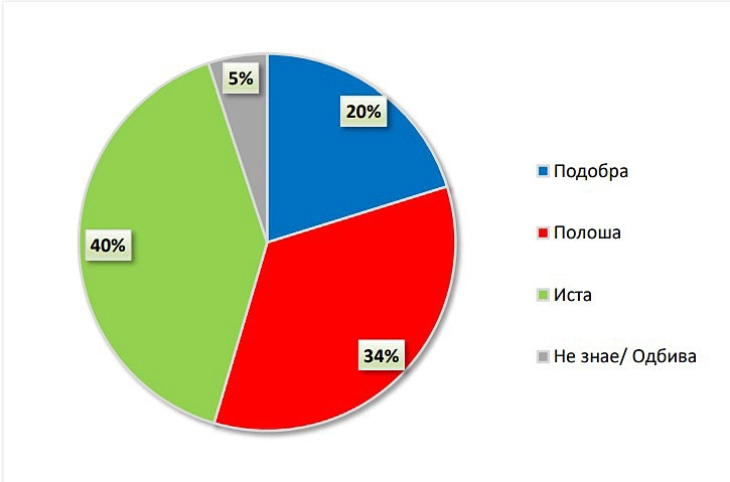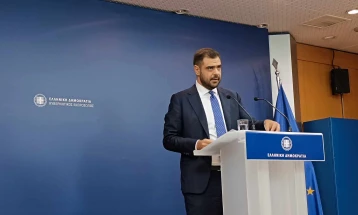Gallup International: Only one-fifth of Macedonians expect 2024 to be better than 2023; global concerns over wars and economic difficulties
- Only 20 percent of the country's citizens expect 2024 to be better than 2023 (the global average is 39%). Thirty-four percent believe it will be worse (the global average is 26%), and 40 percent think it will remain the same as this year (the global average is 28%), as revealed by the Gallup International End of Year (EoY) survey, conducted in North Macedonia by Brima from December 1 to 22 through face-to-face interviews with 1,203 respondents.

Skopje, 29 December 2023 (MIA) - Only 20 percent of the country's citizens expect 2024 to be better than 2023 (the global average is 39%). Thirty-four percent believe it will be worse (the global average is 26%), and 40 percent think it will remain the same as this year (the global average is 28%), as revealed by the Gallup International End of Year (EoY) survey, conducted in North Macedonia by Brima from December 1 to 22 through face-to-face interviews with 1,203 respondents.
In the region, Kosovo (68%) and Albania (57%) have the highest level of ‘positive’ responses from respondents, i.e. those who believe that 2024 will be ‘better’ than 2023. Similar to Macedonia (20%), respondents in Serbia (19%) and Bulgaria (18%), also show a high level of pessimism regarding the upcoming year.
In connection to economic prosperity, respondents in the country show evident pessimism when asked about the next year's economic outlook compared to the current year. Seventeen percent (17%) believe that 2024 will be a year of economic prosperity (global average is 28%), 42% anticipate economic difficulties (global average is 39%), and 35% expect it to remain the same as 2023 (global average is 29%).

In the region, Albania (54%) and Kosovo (46%) remain above the global average when it comes to economic prosperity for the year 2024. In contrast, only 16% in Serbia and 10% in Bulgaria believe there will be economic prosperity in 2024, falling below the global average.
As part of this global survey, respondents were questioned about their expectations for the next year, 2024, in terms of global peace. In North Macedonia, 18% express the belief that the upcoming year will be more peaceful than 2023 (global average is 26%), 34% expect it to be 'less peaceful' (global average is 39%), and 41% think it will remain the same (global average is 29%).

Respondents who believe that 2024 will be 'more peaceful' compared to 2023, from the countries in the region, are highest in Albania (45%) and Kosovo (33%), in contrast to Serbia (13%) and Bulgaria (9%). In Albania, 20% expect it to be ‘less peaceful,’ 42% in Kosovo, 46% in Bulgaria and 50% in Serbia. About one-third of respondents in Albania (34%), Bulgaria (33%), and Serbia (32%) predict that 2024 will be the same as 2023, while 15% in Kosovo share the same view. Greece is not included in this global survey.
When asked about the risk of nuclear weapon use in today's world, with options of 'no risk, moderate risk, or high risk,' North Macedonia's responses closely mirror the global average. Notably, 11% (global average is 14%) believe the situation poses 'no risk,' 37% (global average is 37%) see it as having 'moderate risk,' 44% (global average is 40%) believe there is a 'high risk' of nuclear weapon use, and 7% did not respond.
Across the region, Kosovo has the highest percentage, with 53%, of respondents expressing a belief in a ‘high risk’ of the use of nuclear weapons, followed by 43% in Albania, 30% in Serbia and 26% in Bulgaria.

A majority of people around the world expect a troubled, rather than a peaceful, new year in 2024. Eight out of ten citizens across all continents fear a potential nuclear war and assess the risk of such as either moderate or high. A majority also expects economic difficulties rather than economic prosperity next year, although we are past the peak of economic pessimism, with the waning of the COVID-19 pandemic.
One person in four around the globe expects a more peaceful 2024, but two out of five expect the opposite – a more troubled year. Almost all the rest expect the same as before. Thus, worries definitely prevail. A couple of years ago, for instance, the Global Peace Optimism Index revealed almost equal shares of optimists and pessimists. Now apparently, the wars in Ukraine and Gaza unlocked fears around the globe, these are some of the key findings of End of Year Gallup International Association trend survey.
In Ukraine itself, 26% expect a more peaceful year, 33% – more troubled and 36% – the same. The rest could not respond. In Russia the shares are 12% more peaceful, 35% more troubled and 29% the same. The West as a whole seems concerned. In the opposite corner, one could find more countries of the Global South and the Far East, with examples like Afghanistan and Indonesia reaching up to 68% shares of positive expectations in terms of peace and war.

Unfortunately, there is no significant drop in nuclear fears for the coming year. Two-fifths of those interviewed now see a high risk of the use of nuclear weapon. Almost an equal share assess a moderate level of risk, and just 14% seeing no risk. The rest could not answer.
As a year ago, a majority in the USA sees the risk as rather moderate. In Russia, attitudes are similar to those of last year as well – this time declared shares of moderate risk versus shares of high risk are 40% to 20%.
Countries like Germany, USA, Russia show some improvement in expectations in comparison to the end of 2022, although they remain worried. Important actors like Iran, for instance are not pessimistic, India is clearly positive and countries of the Global South, for example, are trending optimistic. Europe – on the contrary – remains not so positive, with the happy exceptions of the Albanian communities. Remarkably, Saudi Arabia shows 84% of positive expectations.
Expectations for the economy also reveal signs of relief, but at a rather weak level. 39% expect a year of more economic difficulties, which is nine points lower than twelve months ago. Expectations for prosperity or at least for no change, on the other hand, indicate some increase, but still negativism clearly prevails.
The Gallup International End of Year Survey (EoY) is an annual tradition initiated by and designed under the chairmanship of Dr. George Gallup in 1977. The survey has been conducted every year since then. This year it was carried out in 41 countries around the world.
A total of 40 428 persons were interviewed globally. In each country a representative sample of around 1,000 men and women was interviewed during October-December 2023 either face to face, via telephone or online. The margin of error for the survey is between +3-5% at 95% confidence level.
Photo: print screen







